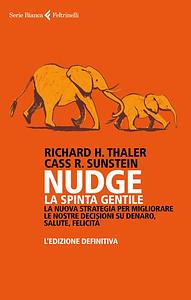Take a photo of a barcode or cover
The first one hundred pages of the book was really something different to me. Before reading that book, i didn't know anything about behavioral economics. The book, in fact, starts with an attempt to give reader the basic knowledge of behavioral economics. It tells common tricks that is used or can be used by producers to affect choice mechanisms of consumers by exploiting the weaknesses of human mind. These common tricks are called nudges. The term "exploiting" i used can be understood in a pejorative meaning. However, the goal of the book is not to use nudges for self-interest of profit-seeking companies, but to use them for general benefit of society, in particular for protecting individual from sometimes even himself. The last phrase can give unavoidably a sense of paternalism.
The key concept the book invented, at that time, comes into solving dilemma: "libertarian paternalism". For the believers of that concept, nudges don't burden extra costs on individuals, so they don't force them to do what the state wants. It still lets individual choose what he wants but with just a little effort that nudges require to avoid what they set up as a default.
The key concept the book invented, at that time, comes into solving dilemma: "libertarian paternalism". For the believers of that concept, nudges don't burden extra costs on individuals, so they don't force them to do what the state wants. It still lets individual choose what he wants but with just a little effort that nudges require to avoid what they set up as a default.
challenging
informative
inspiring
medium-paced
1) Perhaps if I'd read this 10 years ago, I would've found it more interesting. As it stands, now I'm a little bit more skeptical about these kinds of books and the studies they cite
2) I thought this book would be more captivating for a lay audience, but it entirely written for a policy maker lens, which I am not. Wish the marketing & discussion around this book had been more clear about who the intended audience was. Additionally, each of the chapters went on entirely too long; I end up skipping large sections because they were so repetitive.
3) Can the authors please find a thesaurus and use a word other than "salient" occasionally.
2) I thought this book would be more captivating for a lay audience, but it entirely written for a policy maker lens, which I am not. Wish the marketing & discussion around this book had been more clear about who the intended audience was. Additionally, each of the chapters went on entirely too long; I end up skipping large sections because they were so repetitive.
3) Can the authors please find a thesaurus and use a word other than "salient" occasionally.
This is a good complement to Cialdini's book on Influence, and was at times very interesting. Other times, however, it almost put me to sleep -- which is really bad because I listened to it while commuting.
Great read for those interested in how humans work!
Very similar to other books on similar topics, but with ideas to mitigate these issues - not just to highlight them!
Very similar to other books on similar topics, but with ideas to mitigate these issues - not just to highlight them!
this book made me enter my behavioral psychology era. however, it strayed dramatically from the topic at times. why did a quarter of this book teach me about the history of retirement savings? like the point could have been a paragraph but it was sooo long.
however, there was a lot of interesting info and i will think differently about life and policymaking now.
good job dudes!
however, there was a lot of interesting info and i will think differently about life and policymaking now.
good job dudes!
funny
informative
inspiring
reflective
medium-paced
Great and informative book. I learned so much and gained so much insight and have had soooo many ideas from it. Very inspiring.
informative
slow-paced
Nudge describes a design approach called choice architecture, which focuses on, among other things, how a designer of a system can offer and organize choices such that users tend to make the best choices for themselves. They consider a 401K program that offers the most conservative option as the default to be an example of bad choice architecture, since it will usually be the best choice for only a small percentage of the people (and possibly only retirees), if anyone.
The authors also proselytize quite a bit for libertarian paternalism as a philosophy for allowing freedom of choice, while not leaving people to fend for themselves amongst the wolves (or billionaire libertarians secretly funding lawsuits).
Although not a long book, the last few chapters dragged on a bit with a few examples that I found obvious, and a few I found misguided. I'm not so sure an expanded edition was needed.
Despite these complaints, I did enjoy the book quite a bit, and it made me think carefully about how the infrastructure choices I make when designing software ultimately impacts how an end user engages with the overall application.
The authors also proselytize quite a bit for libertarian paternalism as a philosophy for allowing freedom of choice, while not leaving people to fend for themselves amongst the wolves (or billionaire libertarians secretly funding lawsuits).
Although not a long book, the last few chapters dragged on a bit with a few examples that I found obvious, and a few I found misguided. I'm not so sure an expanded edition was needed.
Despite these complaints, I did enjoy the book quite a bit, and it made me think carefully about how the infrastructure choices I make when designing software ultimately impacts how an end user engages with the overall application.

